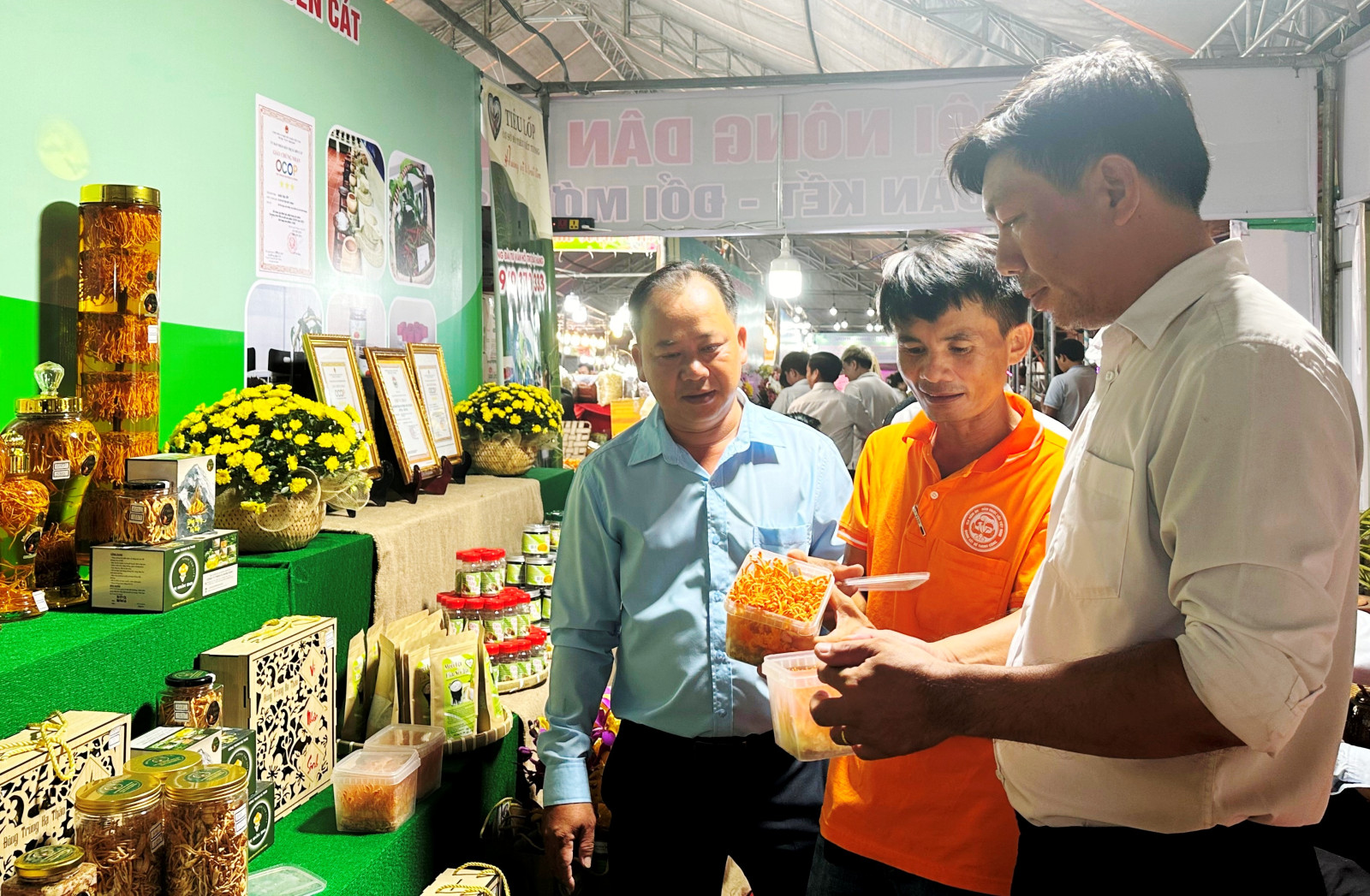OCOP – the process of brand and value affirmation
One commune, one product (OCOP) is a key program for the economic development of rural areas aiming to promote internal resources and increase value. It can be said that each OCOP product carries the role of a ambassador for its respective region, conveying production stories that are rich in human values.

A booth participating in the Trade Fair to introduce and promote agricultural products and OCOPs from Binh Duong in 2024.
Gradual role affirmation
The OCOP program was launched in 2018 under Decision No. 490/QD-TTg dated May 7, 2018, by the Prime Minister, and has now entered its second phase of implementation. OCOPs have gradually exploited and promoted the cultural and traditional values of the locality; affirming their value and quality in the market, earning the trust of consumers. The development of OCOPs has contributed to increasing value, helping entities scale up production and revenue. According to statistics from authorities, the percentage of OCOP entities that increased output after receiving OCOP certification is 46%, the average revenue from sales rose by 29.7%; the percentage of OCOPs with increased selling prices is 50.43%. The program has especially brought about significant changes in commerce, with OCOPs being stably distributed in supermarket systems, widely disseminated and strongly consumed, reaching international markets.
The Department of Rural Development stated that each OCOP carries the unique cultural values of its locality and region. This is precisely the strength of OCOPs compared to mass-produced products. To be recognized as OCOP, a product must meet the required standards; therefore, once it establishes a foothold in the market, the consumption of OCOPs will be stable and develop in the context of the increasingly improved living standards of people today.
The survey results from the authorities indicate that the demand for OCOPs in the international market is currently quite large, especially among the Vietnamese community in various countries, particularly in Europe and the United States. However, to expand the export market for OCOPs, economic experts believe that enterprises and production units need to continue improving product quality and meet the requirements for technical barriers.
The supporting policies vary
In order to support OCOP entities to engage more deeply in the production and supply chain, promote the development of OCOPs in localities, and simultaneously encourage exports, the Ministry of Agriculture and Rural Development (MARD) has collaborated with the Ministry of Industry and Trade and the Vietnam Cooperative Alliance to organize an exhibition of export OCOPs. In addition, the Ministry of Agriculture and Rural Development has signed cooperation programs with the State Bank of Vietnam and the Vietnam Bank for Agriculture and Rural Development to support the development of agriculture and rural areas, including OCOPs. Some banks such as the Bank for Agriculture and Rural Development and the Social Policy Bank have also implemented preferential credit packages for OCOP entities. Along with this, localities have mechanisms to reward OCOP entities when their products are recognized with "stars" at various levels. These are favorable conditions that help OCOP entities access resources to enhance production and business, strive to affirm their brand, and increase the value of their products in both domestic and international markets.
Binh Duong province currently has 219 OCOPs, including 207 products rated 3 stars and 12 products rated 4 stars from 99 entities such as business households, cooperatives, and enterprises. The encouraging point is that many products, after being recognized as OCOP, have established their brands, expanded their consumption markets, and their sales revenue has increased, contributing to the improved profits for the entities. Some notable units with typical OCOPs include Tan My Fruit Tree Cooperative (Bac Tan Uyen District) with its 4-star green skin grapefruit; the bird's nest product of Hieu Hang Co., Ltd.; and the net melon product of Kim Long High-Tech Agriculture Cooperative (Phu Giao District), all of which meet the 3-star OCOP standard. The products of these units have affirmed their brand and value in the market.
Mr. Nguyen Phong Huy, Director of the Department of Rural Development, stated that to support enterprises, cooperatives, and individual farmers in producing and consuming OCOPs, Binh Duong province has implemented many effective solutions for the OCOP Program in the past time. In particular, after the subjects with recognized OCOPs, Binh Duong province coordinated with the Ministry of Industry and Trade to promote trade activities through conferences connecting supply and demand for goods and regional fairs. This creates favorable conditions for OCOPs of the province to be promoted and connected with the supermarket system and distributors, allowing OCOP product owners to consign and consume products stably.
Mr. Nguyen Phong Huy further stated that in the near future, the Agricultural Development Sub-Department will diversify forms of communication, training, and guidance for stakeholders and partners participating in the OCOP Program; with a focus on digital transformation in the management and implementation of the OCOP Program. Along with that, the department continues to effectively implement support solutions for product development, with a focus on solutions to promote product consumption, establishing a system of OCOP sales points, and e-commerce channels for OCOPs; developing support policies for entities and products participating in the OCOP Program that achieve OCOP product certification of 3 stars or higher.
After more than 5 years of implementation, the OCOP Program in Binh Duong has greatly spread its influence, affirming the correct direction of a rural economic development program. The program has made significant contributions to the development of rural industries, expanding markets, and awakening the potential and advantages of various regions and localities to foster rural economic growth, contributing to the effective and sustainable construction of new rural areas.
Reported by Thoai Phuong – Hai Duong – Translated by Vi Bao

